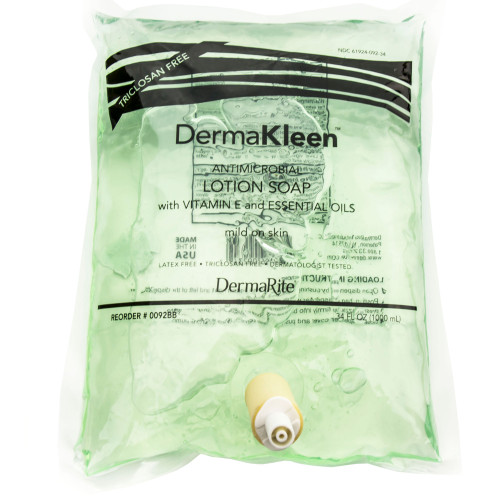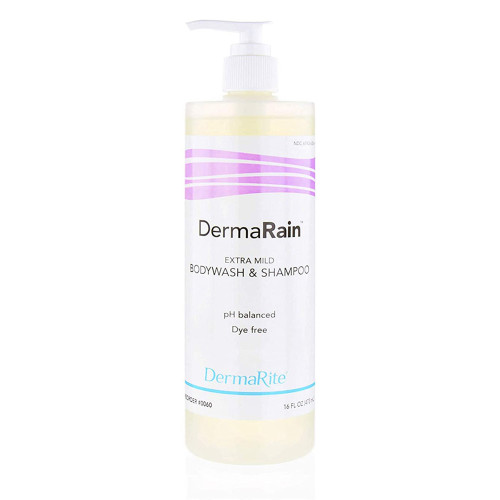-

Classic
Classic Shampoo and Body Wash Floral Scent Jug
Minimizes potential skin irritations Additives such as aloe vera and lanolin help leave skin smooth and supple; hair soft and manageable Designed to meter properly through automatic dispensing systems found on all major brands of equipment The soap-free...
$21.40 -

Mindray
Mindray Diagnostic Recording Paper 50 mm X 20 Meter
Thermal recording paper for a variety of monitors.For use with Accutorr V, DPM3, DPM4, DPM5, DPM6, DPM7, Passport V, Trio, Passport 12m and Passport 17m monitors
As low as $13.22 -

McKesson
McKesson Premium Adult Cuff Arm Aneroid Sphygmomanometer Unit
The McKesson Premium Pocket Aneroid Sphygmomanometer is great for professional use on adult patients. It features a luminescent dial on a chrome plated gauge and a chrome plated brass air release valve with micro-threads for exact control of deflation...
$26.99 -

Dermarite
TotalBath Shampoo and Body Wash Scented 1,000 mL Dispenser Refill Bag
This TotalBath® Skin and Hair Cleanser is mild enough for daily use. It's suitable for every type of skin and hair. Use it on the entire body. The 1,000 ml lotionized shampoo and body wash comes in a dispenser refill bag. It also makes a mild lather when...
As low as $12.42 -

Dermarite
Renew Shampoo and Body Wash Coconut Scent 8 oz. Flip Top Bottle
Rich, creamy lather washes away dirt and odor Natural emollients in vitamins A, B, D and E, and shea butter leave skin feeling soft and smooth
$11.20 -

Dermarite
DermaVera Shampoo and Body Wash Scented 1,000 mL Dispenser Refill Bag
DermaVera is a pH balanced full-body cleanser and shampoo. Formulated with shea butter this cleanser helps to nourish and moisturize skin and hair. DermaVera lathers into a rich foam and leaves behind a pleasant scent. This refill bag of DermaVera holds...
$52.16 -

Brazos
Brazos Twisted Bocote T-Handle Cane, 250 lbs. Weight Capacity
Brazos handcrafts each of their real wood walking sticks and canes in the Brazos River Valley area of central Texas. Brazos uses only the highest quality trees to create one-of-a-kind walking aids.This cane is made of bocote. Bocote is an exotic wood...
$79.29 -

McKesson
McKesson Diagnostic Recording Paper 8.27'' X 80' Z-Fold
McKesson Thermal ECG Recording Paper is compatible with the Schiller AT-10 cardiograph machine. Designed to offer consistent trace quality, this ECG paper is intended to be fully compatible to perform with the most prevalent devices in use today. Get...
$17.26 -

Brazos
Brazos Twisted American Hardwood T-Handle Cane, 250 lbs. Weight Capacity
Brazos handcrafts each of their real wood walking sticks and canes in the Brazos River Valley area of central Texas. Brazos uses only the highest quality trees to create one-of-a-kind walking aids. The Brazos twisted assorted hardwoods walking cane is a...
$41.57 -

Dermarite
DermaVantage Hand and Body Moisturizer Scented Lotion Bottle
DermaVantage® Moisturizing Lotion is a penetrating lotion that moisturizes and nourishes dry, irritated skin. Excellent for sensitive skin. This lotion is nongreasy and softens dry as well as rough spots.Excellent results on rough, dry areas of face,...
As low as $6.15 -

Dermarite
DermaRain Shampoo and Body Wash Scented 16 oz. Pump Bottle
Package Count: 12. DermaRain is an extra mild skin cleanser and shampoo Cleans and moisturizes even fragile sensitive skin without irritation Dye free 16 oz
$37.18 -

Dermarite
DermaVera Shampoo and Body Wash Scented 4 oz. Flip Top Bottle
Package Count: 96. DermaVera is a pH balanced full-body cleanser and shampoo. Formulated with shea butter this cleanser helps to nourish and moisturize skin and hair. DermaVera lathers into a rich foam and leaves behind a pleasant scent. This bottle of...
$74.20
Caregiver Essentials

Caregiver Essentials
There’s no manual for being a caregiver — at least not if you’re caring for someone close to you. Your needs as a caregiver will be as unique as the person you’re caring for and may vary from day to day. There are, however, some essential items that most caregivers should have on hand.
Everyday Items
You might not think of it as a caregiving tool, but your smartphone can literally be a lifesaver — just make sure that a charger is part of your kit. Other everyday items every carer should have are an address book or contact list with important numbers like healthcare providers and a pocket calendar or planner for writing down appointments.
Medication and Related Items
Keep a list of all medications your patient is taking so you have it handy for medical professionals. If the list is long, consider printing it out and keeping several copies on hand. A medication schedule/checklist can also be helpful, as can a pill organizer.
Everyday Items
You might not think of it as a caregiving tool, but your smartphone can literally be a lifesaver — just make sure that a charger is part of your kit. Other everyday items every carer should have are an address book or contact list with important numbers like healthcare providers and a pocket calendar or planner for writing down appointments.
Vitals Kit
While it might not be part of your routine, there may be situations where taking vitals might be helpful or even essential. Keeping the basics such as a thermometer, blood pressure monitor, stethoscope, and pulse oximeter in your medicine chest is a wise idea.
And, of course, if the person you’re caring for has diabetes, a glucose monitoring system is necessary. If your vitals kit includes a mercury thermometer, be sure to include a mercury spill kit in case of breakage.
Protective and Sanitizing Equipment
PPE, gowns, hand sanitizer, wipes — both disinfectant and personal care types — belong in every caregiver’s tool kit. Travel-sized bottles of hand sanitizer can be comfortably carried in a pocket or purse, or opt for a countertop pump bottle. If you are using sanitizer many times during the day, you might consider installing a refillable dispenser.
First Aid Kit
Every household should own a first aid kit. First aid kits typically contain antiseptic wipes, bandages and gauze pads, medical tape, antibiotic ointment, burn cream, eyewash, and other items you may need to treat minor wounds. Make sure you know where your first aid kit is located, and restock any items that get used.
Incontinence Products
While not every caregiver will need them, staying well-stocked is a must if you’re caring for someone who is incontinent or who has the occasional accident. So ensure that you have on hand not only their preferred product, such as disposable underwear, but also a change of clothes, bed protectors, and a change of bedding.
Rinse-Free Personal Care Items
Even if the person you’re caring for is capable of bathing, there may be days when they — or you — are simply not up to the task of a bath or a shower. On days like these, dry shampoos, leave-in conditioners, and rinse-free body wash are a great way to keep up with personal hygiene without the physical stress of getting into and out of the shower or tub.
Being a caregiver is rewarding but can be overwhelming, too. Having the right tools in your caregiving toolkit can reduce the stress involved in this challenging relationship. For all your caregiver essentials, visit SimplyMedical today.
There’s no manual for being a caregiver — at least not if you’re caring for someone close to you. Your needs as a caregiver will be as unique as the person you’re caring for and may vary from day to day. There are, however, some essential items that most caregivers should have on hand.
Everyday Items
You might not think of it as a caregiving tool, but your smartphone can literally be a lifesaver — just make sure that a charger is part of your kit. Other everyday items every carer should have are an address book or contact list with important numbers like healthcare providers and a pocket calendar or planner for writing down appointments.
Medication and Related Items
Keep a list of all medications your patient is taking so you have it handy for medical professionals. If the list is long, consider printing it out and keeping several copies on hand. A medication schedule/checklist can also be helpful, as can a pill organizer.
Everyday Items
You might not think of it as a caregiving tool, but your smartphone can literally be a lifesaver — just make sure that a charger is part of your kit. Other everyday items every carer should have are an address book or contact list with important numbers like healthcare providers and a pocket calendar or planner for writing down appointments.
Vitals Kit
While it might not be part of your routine, there may be situations where taking vitals might be helpful or even essential. Keeping the basics such as a thermometer, blood pressure monitor, stethoscope, and pulse oximeter in your medicine chest is a wise idea.
And, of course, if the person you’re caring for has diabetes, a glucose monitoring system is necessary. If your vitals kit includes a mercury thermometer, be sure to include a mercury spill kit in case of breakage.
Protective and Sanitizing Equipment
PPE, gowns, hand sanitizer, wipes — both disinfectant and personal care types — belong in every caregiver’s tool kit. Travel-sized bottles of hand sanitizer can be comfortably carried in a pocket or purse, or opt for a countertop pump bottle. If you are using sanitizer many times during the day, you might consider installing a refillable dispenser.
First Aid Kit
Every household should own a first aid kit. First aid kits typically contain antiseptic wipes, bandages and gauze pads, medical tape, antibiotic ointment, burn cream, eyewash, and other items you may need to treat minor wounds. Make sure you know where your first aid kit is located, and restock any items that get used.
Incontinence Products
While not every caregiver will need them, staying well-stocked is a must if you’re caring for someone who is incontinent or who has the occasional accident. So ensure that you have on hand not only their preferred product, such as disposable underwear, but also a change of clothes, bed protectors, and a change of bedding.
Rinse-Free Personal Care Items
Even if the person you’re caring for is capable of bathing, there may be days when they — or you — are simply not up to the task of a bath or a shower. On days like these, dry shampoos, leave-in conditioners, and rinse-free body wash are a great way to keep up with personal hygiene without the physical stress of getting into and out of the shower or tub.
Being a caregiver is rewarding but can be overwhelming, too. Having the right tools in your caregiving toolkit can reduce the stress involved in this challenging relationship. For all your caregiver essentials, visit SimplyMedical today.
